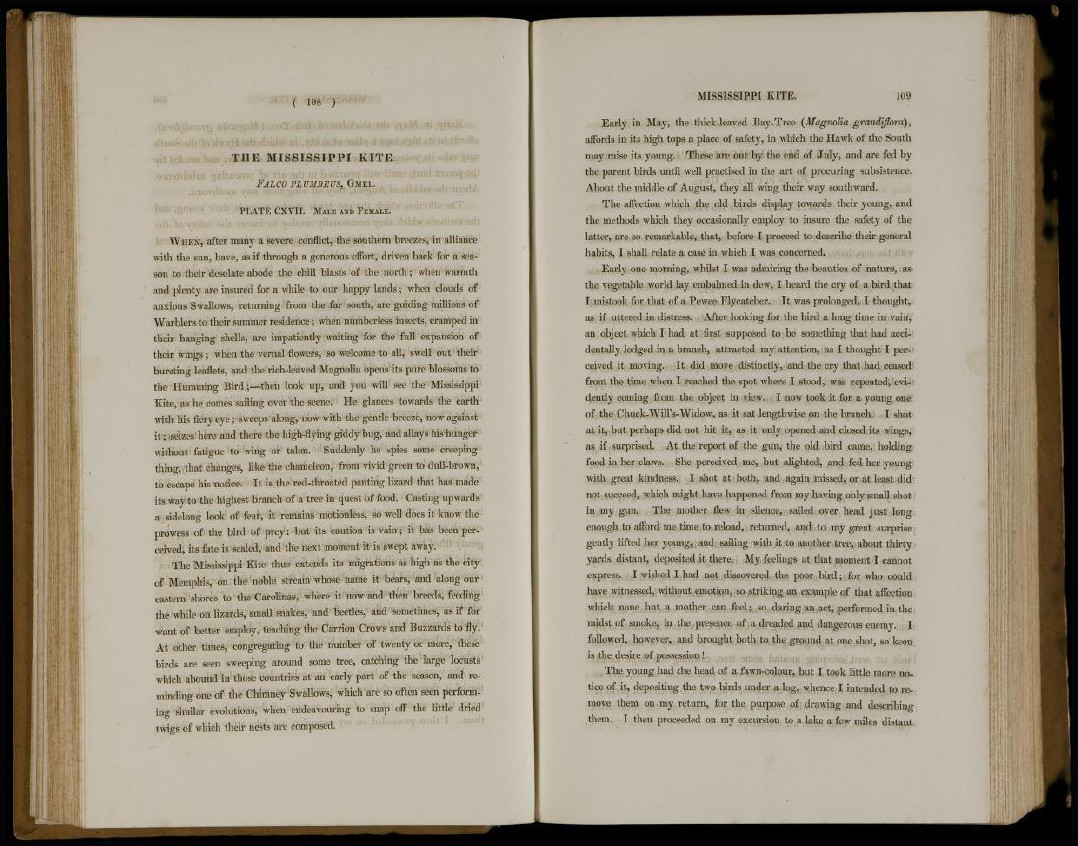
MISSISSIPPI KITE. 109
Early in May, the thick-leaved Bay-Tree (Magnolia grandiflord),
affords in its high tops a place of safety, in which the Hawk of the South
may raise its young. These are out by the end of July, and are fed by
the parent birds until well practised in the art of procuring subsistence.
About the middle of August, they all wing their way southward.
The affection which the old birds display towards their young, and
the methods which they occasionally employ to insure the safety of the
latter, are so remarkable, that, before I proceed to describe their general
habits, I shall relate a case in which I was concerned.
Early one morning, whilst I was admiring the beauties of nature, as
the vegetable world lay embalmed in dew, I heard the cry of a bird that
I mistook for that of a Pewee Flycatcher. It was prolonged, I thought,
as if uttered in distress. After looking for the bird a long time in vain,
an object which I had at first supposed to be something that had accidentally
lodged in a branch, attracted my attention, as I thought I perceived
it moving. It did move distinctly, and the cry that had ceased
from the time when I reached the spot where I stood, was repeated, evidently
coming from the object in view. I now took it for a young one
of the Chuck-Will's-Widow, as it sat lengthwise on the branch. I shot
at it, but perhaps did not hit it, as it only opened and closed its wings,
as if surprised. At the report of the gun, the old bird came, holding
food in her claws. She perceived me, but alighted, and fed her young
with great kindness. I shot at both, and again missed, or at least did
not succeed, which might have happened from my having only small shot
in my gun. The mother flew in silence, sailed over head just long
enough to afford me time to reload, returned, and to my great surprise
gently lifted her young, and sailing with it to another tree, about thirty
yards distant, deposited it there. My feelings at that moment I cannot
express. I wished I had not discovered the poor bud; for who could
have witnessed, without emotion, so striking an example of that affection
which none but a mother can feel; so daring an act, performed in the
midst of smoke, in the presence of a dreaded and dangerous enemy. I
followed, however, and brought both to the ground at one shot, so keen
is the desire of possession!
The young had the head of a fawn-colour, but I took little more notice
of it, depositing the two birds under a log, whence I intended to remove
them on my return, for the purpose of drawing and describing
them. I then proceeded on my excursion to a lake a few miles distant.
T H E M I S S I S S I P P I KITE.
FALCO PLUMBEUS, GMEL.
P L A T E C X V I I . M A L E A N D F E M A L E .
WHEN, after many a severe conflict, the southern breezes, in alliance
with the sun, have, as if through a generous effort, driven back for a season
to their desolate abode the chill blasts of the north; when warmth
and plenty are insured for a while to our happy lands; when clouds of
anxious Swallows, returning from the far south, are guiding millions of
Warblers to their summer residence; when numberless insects, cramped in
their hanging shells, are impatiently waiting for the full expansion of
their wings ; when the vernal flowers, so welcome to all, swell out their
bursting leaflets, and the rich-leaved Magnolia opens its pure blossoms to
the Humming Bird;—then look up, and you will see the Mississippi
Kite, as he comes sailing over the scene. He glances towards the earth
with his fiery eye; sweeps along, now with the gentle breeze, now against
it; seizes here and there the high-flying giddy bug, and allays hishunger
without fatigue to wing or talon. Suddenly he spies some creeping
thing, that changes, like the chameleon, from vivid green to dull-brown,
to escape his notice. It is the red-throated panting lizard that has made
its way to the highest branch of a tree in quest of food. Casting upwards
a sidelong look of fear, it remains motionless, so well does it know the
prowess of the bird of prey: but its caution is vain; it has been perceived,
its fate is sealed, and the next moment it is swept away.
The Mississippi Kite thus extends its migrations as high as the city
of Memphis, on the noble stream whose name it bears, and along our
eastern shores to the Carolinas, where it now and then breeds, feeding
the while on lizards, small snakes, and beetles, and sometimes, as if for
want of better employ, teaching the Carrion Crows and Buzzards to fly.
At other times, congregating to the number of twenty or more, these
birds are seen sweeping around some tree, catching the large locusts
which abound in those countries at an early part of the season, and reminding
one of the Chimney Swallows, which are so often seen performing
similar evolutions, when endeavouring to snap off the little dried
twigs of which their nests arc composed.